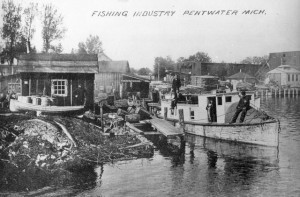
Pentwater, Michigan, once had commercial fishing operations scattered all around Pentwater Lake. No trace of the this fishing world remains today.
Don’t change anything. Many people—maybe most—thought that was our mission when the Fishtown Preservation Society (FPS) purchased the core historic part of Fishtown in February 2007. We’ve tried our best to follow that principle with the maintenance, planning and interpretation we’ve done. Still, something important did change in 2007: Fishtown had always been owned by experienced commercial fishing families; now it’s owned by a nonprofit organization run by a board of directors and staff. This change wasn’t physical, so not many people noticed, but it was dramatic enough that more than a few people have told me they held their breath for the first couple of years, waiting to see how things would turn out.
Things change, in ways we don’t always see at the time. What we didn’t see then was that, in a small but important way, we were changing the course of history. The story of Great Lakes commercial fishing had been one of constant, unrelenting decline. Both the biology of the lakes and government regulations changed, and for decades few commercial fishing families were able to pass their operations on to the next generation. Where fishing stopped, the wood shanties quickly fell apart and the land became prime waterfront development property. When FPS purchased our part of Fishtown, we did more than preserve some docks, shanties and smoke houses along the Leland River. We also stopped the pattern of relentless decline. In Fishtown, commercial fishing continues.
There is change, even in Fishtown, where we are trying to keep things the same. But that is exactly as it has been for generations, directly connecting Fishtown’s present with its past. You see this change whenever you look at any of Fishtown’s shops on the north side of the river, or the residences and seasonal accommodations on the south side.
Preservationists refer to it as “adaptive reuse,†finding new uses for buildings that have outlived their original purpose. In Fishtown this process began when fishing went into serious decline in the 1950s, when fishermen, rather than tearing down the shanties, either sold or found new uses for them. In the early 1970s the Steffens and Stallman families rented space to artists and others in part because they realized these attractions would draw visitors into Fishtown to buy their fish.
When Bill Carlson and his family purchased the Steffens and Stallman properties in the mid-1970s, they hoped their fishery would benefit from the traffic drawn to the shops on the river. The artists and shops seemed like a big change then, but it was really what Fishtown has always been about: finding creative ways to keep on fishing.
The recent issue of our newsletter describes some recent changes in Fishtown and FPS. (All FPS donors receive the newsletter; if you would like to receive a copy, please let us know). New FPS president Berkley Duck shares how a childhood trip to Fishtown helped shape his future (and ours). Outgoing president Craig Miller reflects on Fishtown and why he not only devotes so much energy to this cause, but how he plans to care for Fishtown after he’s gone. We also talk with Nels Carlson, the fifth generation of the Carlson family to operate a business out of Fishtown. With his business partner, Joe Campo, he plans both to honor his family’s tradition here as well as to build upon the strengths of the fishery business and make changes to stamp it as his own.
Fishtown Preservation is facing a number of difficult challenges. However, the optimism and stubborn determination of the fishermen who now work with us have changed how I see problems. Things happen to fishermen miles from shore. Engines fail, ropes break, squalls come from a clear sky. Things happen in Fishtown, too. Dock boards break, winds tear at shingles, the lake level gets too low. The thing we value most about Fishtown—that it’s open to the elements—is what makes it need such constant attention and care. This is something the fishermen always knew. It’s something we’ve learned.
We’ve also learned, in almost six years, that we need to keep adapting and keep going, because in Fishtown changes happen every day. You support Fishtown Preservation, I think, because you understand that keeping things the same is still changing history. What will never change is that we all love this place. That’s why Fishtown is still fishing.
